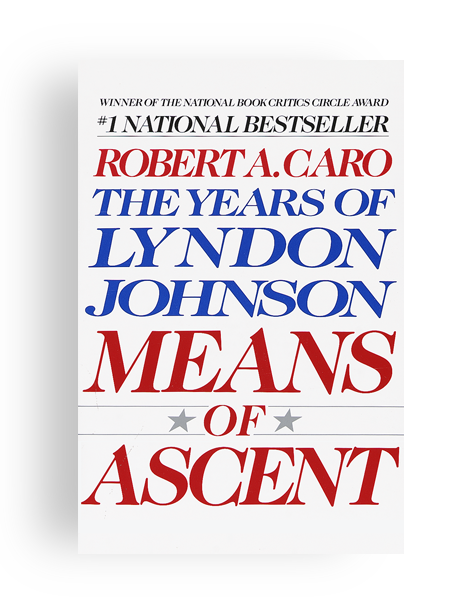NATIONAL BEST SELLER
Working
Robert Caro gives us a glimpse into his own life and work in these evocatively written, personal pieces. He describes what it was like to interview the mighty Robert Moses and to begin discovering the extent of the political power Moses wielded; the combination of discouragement and exhilaration he felt confronting the vast holdings of the Lyndon B. Johnson Library in Austin, Texas; his encounters with witnesses, including longtime residents wrenchingly displaced by the construction of Moses’ Cross-Bronx Expressway and Lady Bird Johnson acknowledging the beauty and influence of one of LBJ’s mistresses. He gratefully remembers how, after years of working in solitude, he found a writers’ community at the New York Public Library, and details the ways he goes about planning and composing his books.
Caro recalls the moments at which he came to understand that he wanted to write not just about the men who wielded power but about the people and the politics that were shaped by that power. And he talks about the importance to him of the writing itself, of how he tries to infuse it with a sense of place and mood to bring characters and situations to life on the page. Taken together, these reminiscences—some previously published, some written expressly for this book—bring into focus the passion, the wry self-deprecation, and the integrity with which this brilliant historian has always approached his work.
Praise for Working
STEVE FORBES, FORBES
“A short book that packs a big wallop…Stunningly incisive… Caro’s unrelenting pursuit of facts and his insights will leave you in awe…After reading this brief, brilliant book, one can only say, ‘Wow!’”
HAROLD EVANS, THE NEW YORK TIMES BOOK REVIEW (COVER)
“Iridescent, so many brilliant refractions of light from his hard slog of discovering what life has really meant for the people in his narratives, the powerful and the powerless…Caro wanted the reader to feel for them, empathize with their ambitions and their torments…Robert Caro…has measurably enriched our lives with his intellectual rigor, his compassion, his openness, his wit and grace.”
Tom & Mandy Levis
EVAN THOMAS, THE WASHINGTON POST
“Caro’s work is the gold standard of deep-dive biography; he has become an almost mythic figure, relentless in the ever-elusive pursuit of truth. In Working, he shares tips on researching, interviewing and writing, showcased in wonderful, revealing, often funny anecdotes…Its real theme goes far beyond authorial tradecraft. Caro’s own life has been an epic of human endeavor, a tale of obsession…Writing truth to power takes time.”
LANCE MURROW, CITY JOURNAL
“If I were teaching journalism or nonfiction writing, especially the writing of history and biography, I would build a course around Caro, with Working as my primary text and scenes from his Johnson books as case studies…It’s possible that he is all the education that a writer in this line of work requires…Caro’s central secret is that, if facts matter in the writing of history and biography, then writing matters, too: that words matter, the aura and attitude of the language, the skill and power of its formulation.”
ARYN BRAUN, THE ECONOMIST
“America’s biographer-in-chief…charts his own extraordinary life.”
DAVID SHRIBMAN, LOS ANGELES TIMES
“A feast for anyone interested in reading, and in writing…A glimpse inside the head, and the work, of one of the great masters of contemporary nonfiction…Might be regarded as the path to writing with power.”
SCOTT DETROW, NPR
“An inspiring window into the seemingly superhuman reporting, researching, writing, patience, and above all, will-power that have empowered Caro’s reinvention of the political biography and history genre.”

Photo by Arnold Newman
Below are selections from the Robert A. Caro Archive, Patricia D. Klingenstein Library, New-York Historical Society.
Smith Corona Electra 210 typewriter, circa 1970s
Typewriters continue to play fundamental roles in Caro’s writing process. This is less motivated by an aversion to technology than a recognition of the typewriter’s utility as a tool that complements his methodical approach to research and writing. For Caro, speed is a liability. It’s why notes to himself like “Don’t rush!” make regular appearances in his papers.


Typed notes for “Anatomy of a $9 Burglary”, 1964
“Anatomy of a $9 Burglary” is among Caro’s best early writing. When police arrested a criminal, all signs indicated a simple case of burglary and petty larceny. Instead, Caro unearthed the story of those affected by the accused’s crimes, especially that of his forbearing wife. Few articles better demonstrate his gift for plumbing the true depth of a story, or his use of powerful concluding lines and paragraphs.
Robert Caro’s writing process
Caro says he writes his first drafts in longhand because it’s the slowest way of committing thoughts to paper.
“The prose in Caro’s biographies is a mesmerizing combination of fine-grained, meticulous detail recounted in lush, incantatory sentences,“ says Jennifer Szalai, in The New York Times. “He is always trying to accumulate enough material to ‘show’ rather than to tell — ‘to make readers not only see but understand and feel’ the consequences of power.”
Photo by Martha Kaplan

There are certain moments in your life when you suddenly understand something about yourself. I loved going through those files, making them yield their secrets to me…I don’t know why raw files affect me that way. In part, perhaps, it’s because they are closer to reality, to genuineness—not filtered, cleaned up, through press releases or, years later, in books. I worked all night, but I didn’t notice the passing of time. When I finished and left the building on Sunday, the sun was coming up, and that was a surprise. I went back to the office, and before driving home I wrote a memo on what I had found.
ROBERT CARO REFLECTING ON HIS FIRST INVESTIGATIVE WORK FOR NEWSDAY
Robert Caro Books
He has measurably enriched our lives with his intellectual rigor, his compassion, his openness, his wit and grace.
SIR HAROLD EVANS, THE NEW YORK TIMES





